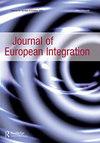De facto differentiated disintegration in the European Union. The case of Poland
IF 3.1
1区 社会学
Q1 INTERNATIONAL RELATIONS
引用次数: 0
Abstract
ABSTRACT This article seeks to shed light on the evolution of demand for differentiation in Poland. First, it argues that since EU accession Poland has moved from instrumental towards quasi-constitutional differentiated integration, and towards differentiated disintegration de facto. Second, it conceptualizes non-compliance in the rule of law area as a manifestation of differentiated disintegration de facto understood as polity-related deliberate and enduring circumvention of EU legal framework. Third, it argues that this mode of de facto differentiation constitutes a challenger strategy of Poland’s populists in power aimed at undermining the foundations of the European polity. Accordingly, the Polish case provides an illustration of ‘post-functionalism reversed’: it is not a Eurosceptic public that constrains a pro-integrationist government, but a Eurosceptic government that drives differentiation and disintegration without explicit support from the largely pro-integrationist public.欧盟事实上的分化解体。波兰的例子
摘要本文旨在阐明波兰差异化需求的演变。首先,它认为,自加入欧盟以来,波兰已从工具性走向准宪法的差异化一体化,并在事实上走向差异化解体。其次,它将法治领域的不遵守行为概念化为有区别的解体的表现,事实上被理解为与政治有关的蓄意和持久规避欧盟法律框架。第三,它认为这种事实上的分化模式构成了波兰执政民粹主义者的挑战者战略,旨在破坏欧洲政治的基础。因此,波兰的案例提供了一个“后功能主义逆转”的例子:约束支持一体化的政府的不是疑欧派公众,而是在没有得到主要支持一体化的公众明确支持的情况下推动分化和解体的疑欧派政府。
本文章由计算机程序翻译,如有差异,请以英文原文为准。
求助全文
约1分钟内获得全文
求助全文

 求助内容:
求助内容: 应助结果提醒方式:
应助结果提醒方式:


